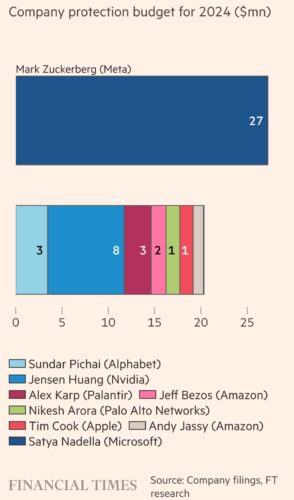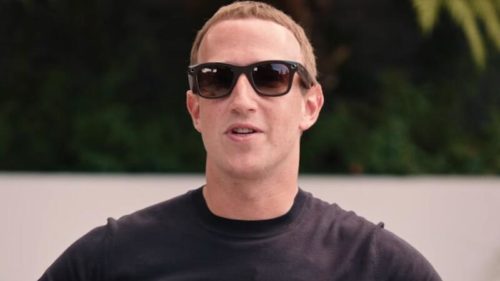Zuckerberg has built the world’s most expensive human contact prevention system while lecturing us about bringing people together.
The Financial Times absolutely burns Meta for spending over $27 million on Mark Zuckerberg’s personal security in 2024—the highest among major tech companies and a jump from $24 million the previous year.
The tech sector had the biggest increase in companies implementing security measures for executives, with a 73.5 per cent jump in those receiving the benefits from 2020 to 2024, according to a report by Equilar.
Meta has long had the highest security bill of the big tech companies. The Facebook parent paid more than $27mn in 2024, up from $24mn a year earlier, for Mark Zuckerberg and his family’s personal security, including at their residences and while travelling, according to disclosures.
This absurd accounting raises uncomfortable questions about leadership isolation, let alone basic economics. Meta could probably give each potential threat a million dollars to disappear, and still save millions to donate to charity that would reduce threats even more. Hell, fund actual community programs that might address why people are pissed off at CEOs in the first place.

When a CEO requires more personal protection spending than entire small nations, it suggests a fundamental disconnect from anyone his platform allegedly serves.
The man who pushes artificial observed connections through his centrally controlled metaverse simultaneously constructs increasingly elaborate barriers between himself and physical reality.
This evil prison guard mentality explains Meta’s persistent tone-deafness—from privacy scandals to content moderation failures. How can someone make rational decisions when they experience the world through $27 million “scared squirrel” goggles designed to filter out basic reality?
Consider the broader pattern:
Zuckerberg buys Hawaiian land for its tropical paradise qualities, then builds walls to block the ocean breeze that made it paradise. Talk about blowing a budget. What’s next, cover it in stainless steel to get rid of the icky plants and yucky sand?
Meta promises human connection while designing platforms that isolate users in algorithmic bubbles. The company’s approach to user privacy and platform governance makes perfect sense when viewed through the shit colored lens of extremist isolationism.

Meta’s business model increasingly resembles what critics have long claimed: a prison system prioritizing control and containment over genuine human connection.
When your lived experience is total confinement by $27M “choice”, perhaps platforms that keep users similarly enclosed become your only reference point for shit “connection.”
The “scared squirrel goggles” line makes me laugh – it’s such a perfect visual for someone experiencing reality through layers of expensive protection